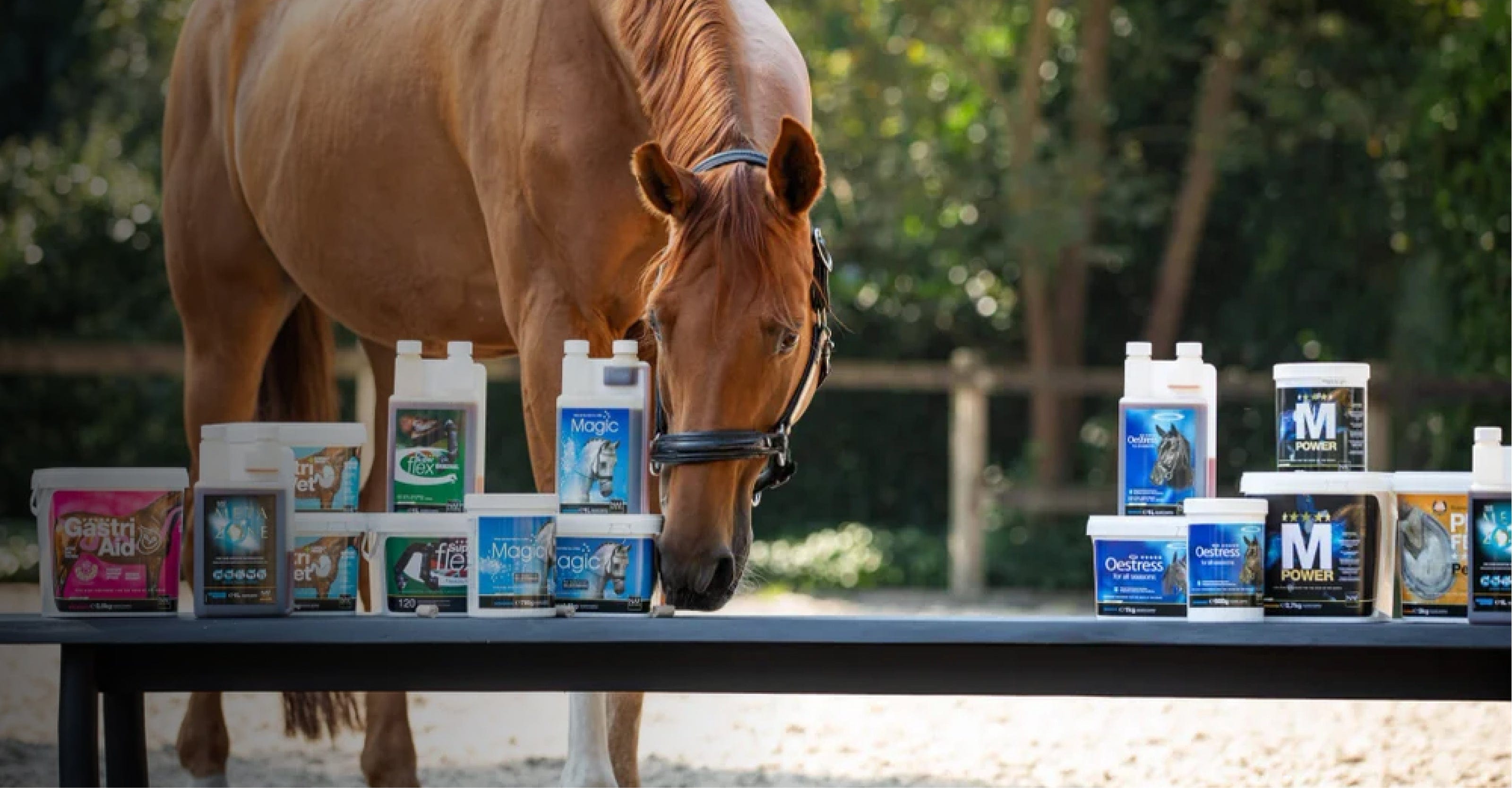What ‘Scientifically Proven Ingredients’ Really Mean in Horse Feed Supplements
When it comes to horse feed supplements, it can be hard to know what’s really backed by science and what’s clever marketing. Terms like “scientifically proven ingredients” or “independently trialled” sound reassuring — but what do they actually mean, and why don’t companies share more details? On this page, we’ll explore the research behind equine supplements, the legal restrictions that govern marketing claims, and why responsible manufacturers must balance science with strict feed regulations.
Hopefully this will help you understand not only where we, as NAF, are coming from, but the challenges facing all those supplement manufacturers who market legally and responsibly.
Where is the research behind NAF products?
Understanding legal restrictions on marketing feed supplements and non-medical applications. Phrases such as ‘scientifically proven ingredients’ or ‘independently trialed’, without additional specific information around that phrase, are often seen on feed supplements rather than bagged or complete feed. Without that further information, the horse owner can be left feeling, understandably, confused or a little frustrated.
What does this mean? Why don’t you see more details on the trials? Are they trying to hide something?!
In brief, feed supplements face a unique challenge. Legally there is no such thing as a ‘supplement’ they are simply classed as feed, and as such come under the same feed law as all other bags, chaffs and bales. That law, particularly Regulation 767/2009, controls marketing claims and strictly prevents any marketing claims perceived as ‘medical’. Therefore, supplements aimed at helping horses with joint issues, respiratory challenge, sensitive skin etc. face a real challenge in how to communicate truthfully, effectively – but legally – with you as to what their product is designed to do, and how they can justify that it will.
Though sometimes frustrating, the restrictions are there for good reason. That is to prevent unsubstantiated or misleading claims, and to ensure that your horse’s veterinary professional rightly remains as the owner’s first call for medical issues. The regulations are complex, and there are exceptions to the following, but there are a few basic principles that apply in most situations.
What can you NOT say marketing feed, including feed supplements?
Feed law prevents the mention of any medical condition by name, and also prevents naming any pharmaceutical. So, for example, a feed supplement aimed at respiratory health could not claim to be a ‘natural alternative to ventapulmin’, or similar, and could not mention, or link to, conditions such as Equine Asthma.
There are exceptions in specific circumstances, such as the BETA EGUS mark and the Laminitis Trust mark on bagged feeds. However these cannot be applied to supplements, and even on complete feed must strictly not imply prevention, treatment or cure. They are only there to signpost to customers those feeds that are suitable for those horses, i.e. when fed correctly they shouldn’t make the condition worse.
Those same legal marketing restrictions also cover functionality of a feed. When it comes to anything considered medical the basic rule is that the product cannot claim to make any change. So you can’t increase, decrease, reduce, improve, remove etc. etc. A feed claim can only keep things the same, not change. Claims covering functionality also cover reporting on trials, which is strictly prohibited, at least where reporting any results which may be considered ‘medical’ are concerned.
Case Study – Part 1
So using that information, consider the following marketing claim in a feed supplement advert.
‘In clinical trials of 30 horses, feeding XSupp resulted in reduced gastroscope ulcer scores.’
As a horse owner, what would you think?
a) This looks great, and just I need. After all, it’s clinically proven and I can see the results.
b) Hang on, this looks like an illegal medical claim to me. I don’t trust this company.
Whilst it is a compelling argument, and one many manufacturers who are committed to research would love to use, sadly, option ‘a’ would be illegal under Feed Law. You should be thinking option ‘b’. There are actually three legal contraventions here:
- Reporting results of clinical trials, including the words ‘reduced ...scores’, so a medical change has been made.
- Use of the word ‘gastroscope’ which would be considered ‘medical by implication’ (a phrase used in the regulations), particularly when linked to scores.
- Mentioning a medical condition, i.e. ‘ulcers’.
This company would face serious consequences from the regulators at the Veterinary Medicines Directorate (VMD), also potentially the Advertising Standards Authority and their local Trading Standards Authority. They would also be contravening the good practice guidelines that all reputable members of the equine feed industry align to.
What CAN you say in marketing feed, including feed supplements?
So what are the options for this, and how does that bring us back to understanding phrases like ‘scientifically proven ingredients’? Under Feed Law, and the associated guidance on claims, you can use words that maintain the status quo in a healthy animal. The words ‘supports’, ‘maintains’, ‘contributes’ and ‘optimises’ are generally considered acceptable. This explains why we so often see phrases like:
- Maintains sound, healthy joints
- Supports respiratory function
- Optimises digestive health
These would be legally acceptable, but do they explain enough to you, the horse owner? After all, as a manufacturer, if we have committed to researching our products, which if done correctly is both time consuming and very expensive, then we really do want to be able to tell your about that, albeit in a legal way.
Trials – the do’s and don’ts.
If the outcome of your trial is deemed, by the authorities, to not be medical then it can be reported and discussed in marketing. For example, trials on behaviour are not considered medical by the VMD, so long as they are only looking at normal reactions in normal day to day situations. However if it went further, i.e. claiming to sedate, or a trial outside of the horse’s normal comfort zone, that would be considered medical.
If the results of the trial are medical, such as reducing gastroscope score, preventing coughing, treating arthritis etc., then even well-run, independent, peer reviewed and published trials cannot be reported or marketed alongside that product. Such results would render the product, in the eyes of the authorities, as a medicine needing a medical license. The only thing that could legally be said would simply be something like ‘Independently trialed’ and maybe ‘Peer reviewed and published’, if a credible scientific journal had published the results.
Case Study – Part 2
Therefore, returning to our example above, which of the following would be a legal alternative?
a) Trial shows reduced scores by vets. Maintains gastric health.
b) Clinically proven supplement. Supports a healthy gastric lining.
c) Clinically proven to provide gastric benefits for horses.
Answer b) is correct.
You couldn’t use ‘a’ as although it doesn’t specifically mention ulcers or gastroscopy, it is still making a claim for change (reduced), and the overall wording would still be considered medicinal.
You couldn’t use ‘c’ as it links the ‘proven’ to trial results, i.e. ‘proven to provide benefits....’
The only thing you can say about a trial in this situation is that it has been done and it is ‘clinically proven’. However, unfortunately, we cannot say what it is proven to do, as we cannot discuss the results in marketing.
What about PARNUTs?
The PARNUTs Regulation (2020/354) is a specific regulatory framework that allows feed to be used for ‘particular nutritional purposes’. These are often medical conditions, but the requirements of the feed are very specific, restricted, and rarely used in horses. If a PARNUT is being used on a feed, it will be labelled as a ‘dietetic’ feed, rather than ‘complementary’.
What does ‘includes scientifically proven ingredients’ mean?
This phrase is often used as a way of showing the research and trials behind a product when the legal marketing restrictions don’t allow those trials to be discussed. However, the same rules apply in terms of results. A company still cannot say ‘scientifically proven ingredients to reduce lameness’, or similar. Therefore we are back to the stand alone type claim of ‘scientifically proven’ – but without the explanation of what that ingredient is proven to do.
How this claim differs to the trials claim above, is that it may be made about one, or several, of the ingredients in the product – but it doesn’t mean that exact formula has scientific trials behind it. There is no legal requirement to run scientific trials on any specific feed, but there is a legal requirement to be able to defend and substantiate anything you claim about your feed, and scientifically proven ingredients are a big part of that.
Relevant inclusion rate
If you are using research to substantiate your ingredient, then that research will have tested the ingredient at a certain rate. That rate must be reflected in your product to support a ‘scientifically proven ingredients’ claim. For example, if trials show that 200mg of X was beneficial to horses daily, then including 50mg X per day in a feed could not support the ‘scientifically proven’ claim.
Equally the opposite is true. If a manufacturer wants to include a particularly high level of an ingredient, firstly they must satisfy themselves that that level is legal within the regulations, and secondly they cannot claim a greater benefit without evidence of that. There is an old adage ‘If 5g is good, then 10g isn’t necessarily twice as good’ and that certainly applies to ingredients. Claims such as ‘optimum level’ or ‘strongest formulation on the market’ must be scientifically justified, and that can’t be simply by providing more than is found in other products.
Take Home Message
Phrases such as ‘scientifically proven ingredients’ or ‘independently trialled’ are usually used to support marketing claims, and inform owners of a product’s credibility, while working within regulatory marketing restrictions on feed. Those claims must be backed by credible evidence. Question claims which appear ‘medical’.
Remember, if it looks too good to be true – it probably is!

